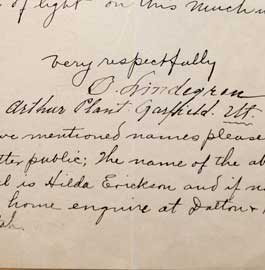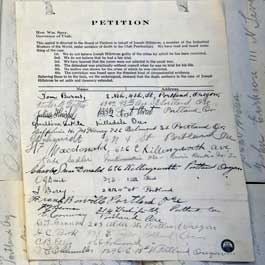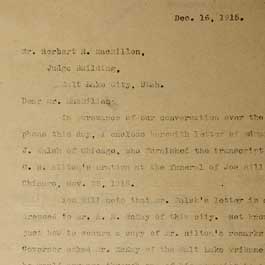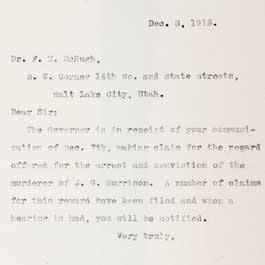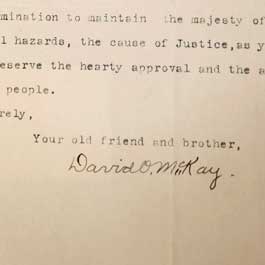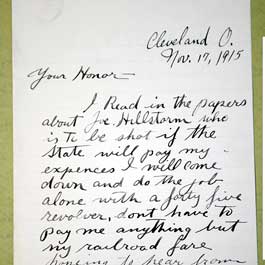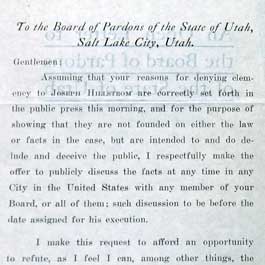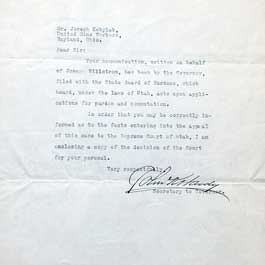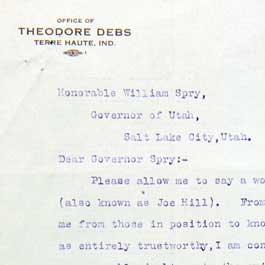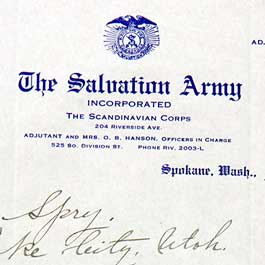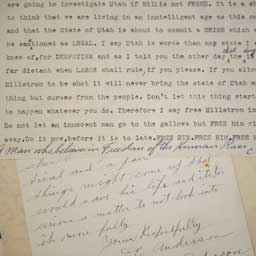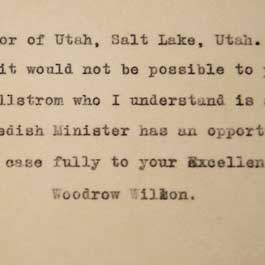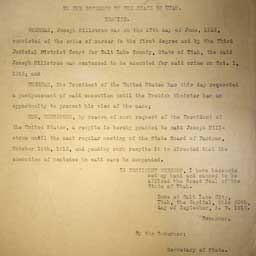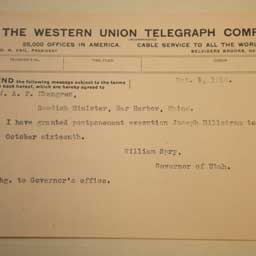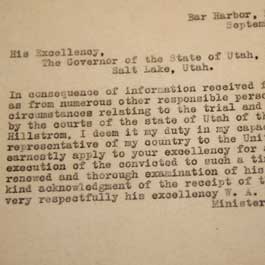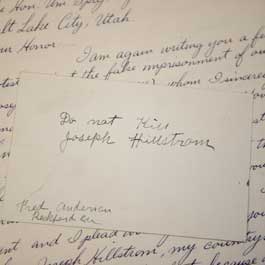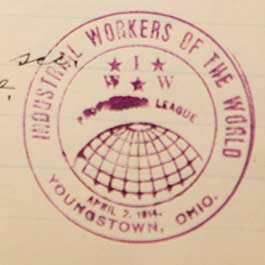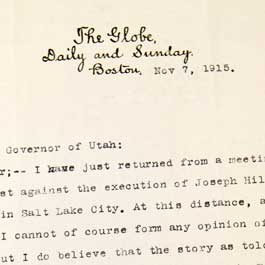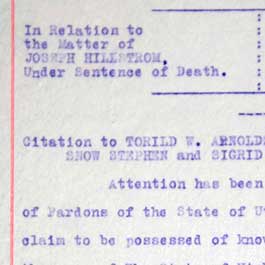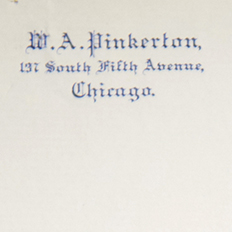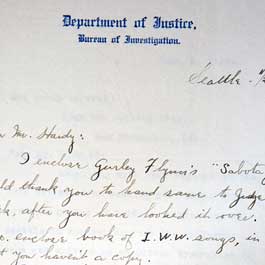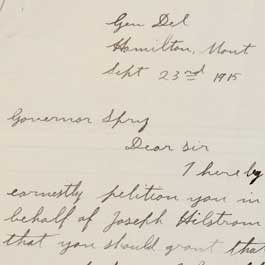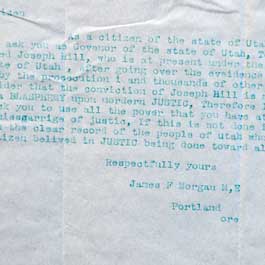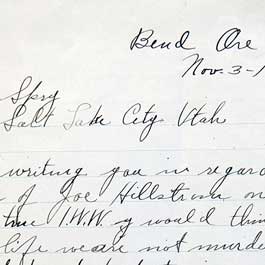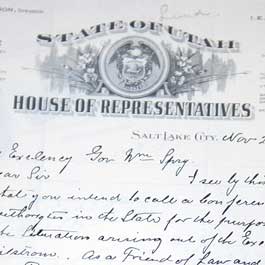Olaf Lindegren
Olaf Lindegren of Murray, Utah, wrote to Gov. William Spry about two months before Hill's execution to inform him that there may be some truth to Joe Hill's claim that he was shot by a friend in a fight about a woman.
Lindegren describes being introduced to Otto Appelquist, who was described as Hilda Erickson's fiancé. He says that because of Hill's friendship with Erickson's family, it is "only natural to suppose" that Hill will not "bring them into the case at any price."
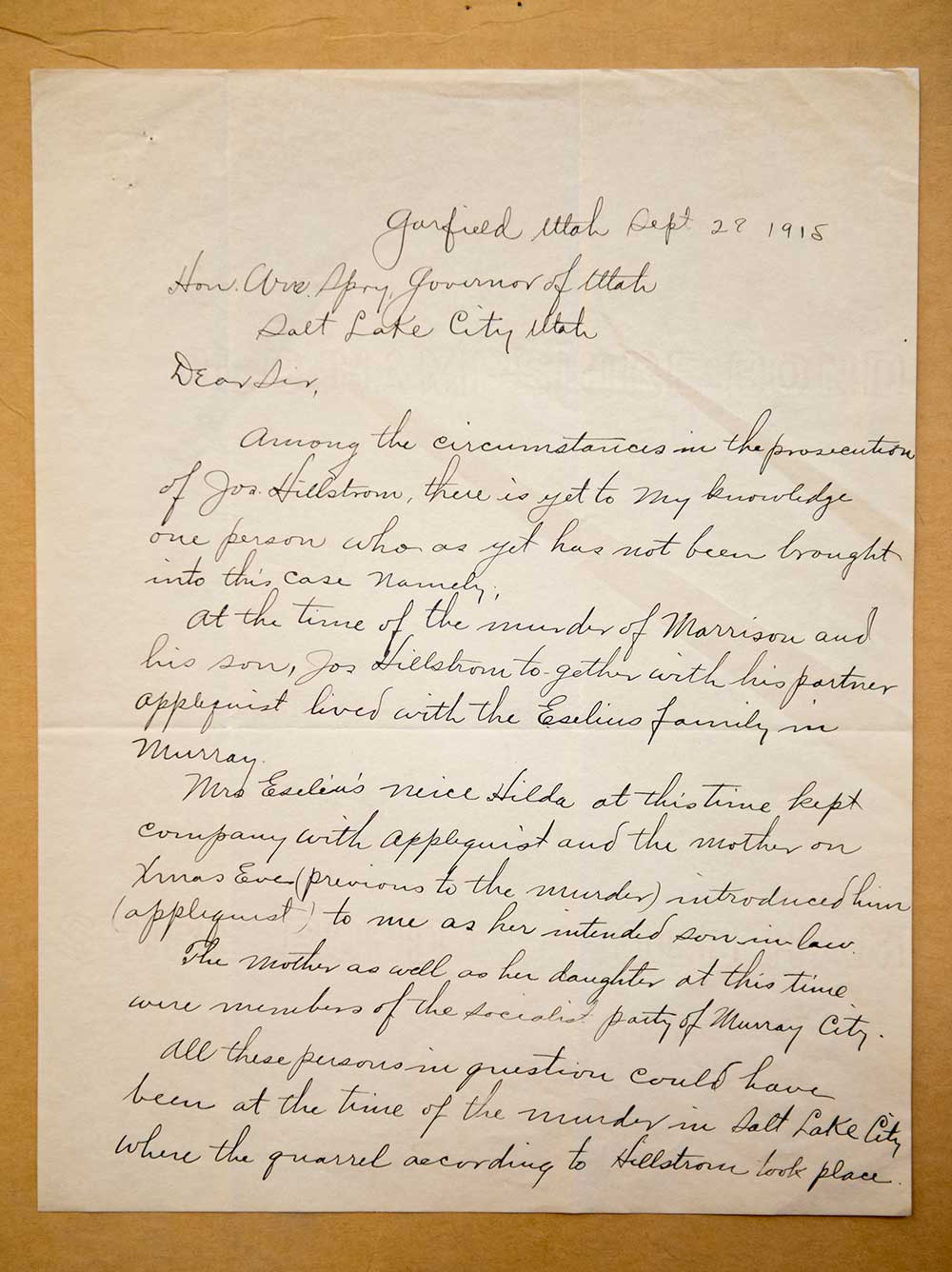
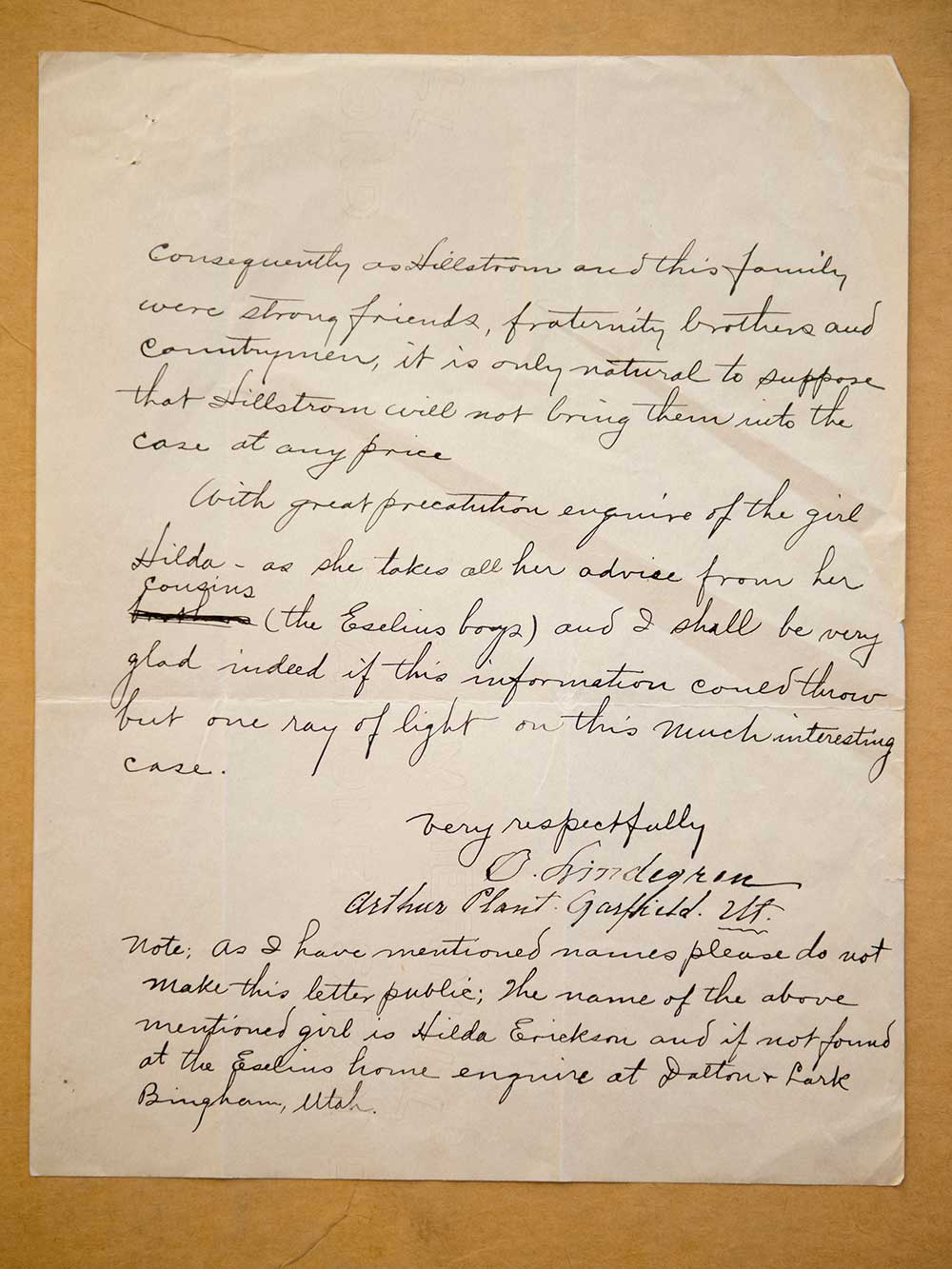
Read the story about this letter by Jeremy Harmon.
Photo by Jeremy Harmon, The Salt Lake Tribune
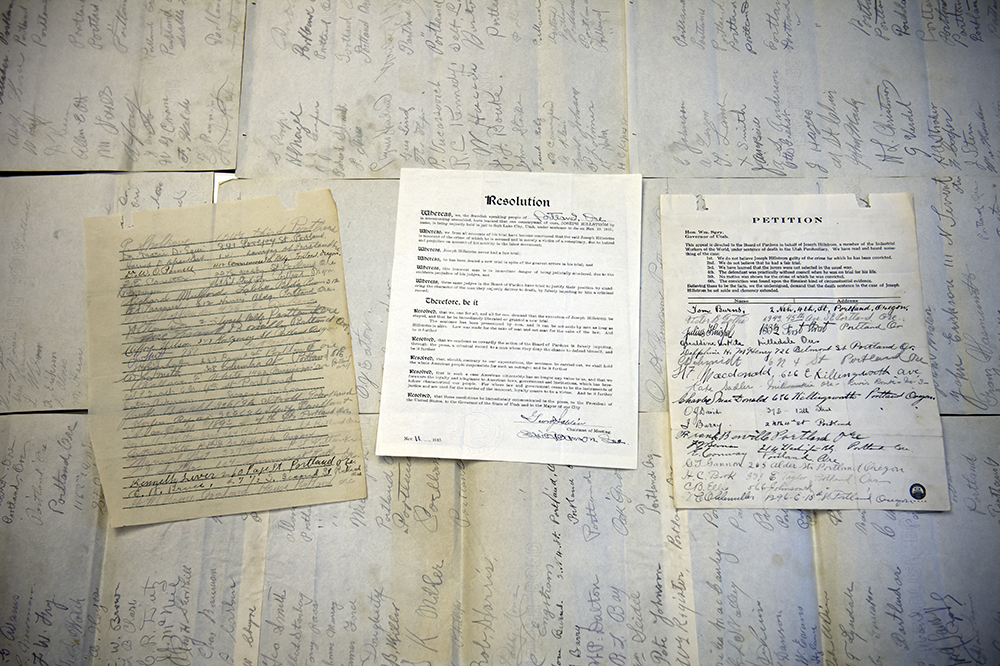
IWW petition
This is a petition from Industrial Workers of the World members and Swedish immigrants in Portland, Ore., demanding, among other things, that Hill "be immediately liberated or granted a new trial."
It is one of many similar petitions sent to Gov. William Spry in the weeks leading up to Hill's execution as part of a massive letter-writing campaign called for by IWW leadership. This petition is dated Nov. 11, 1915, eight days before Hill's death.
Read more about The IWW
Photo by Rick Egan, The Salt Lake Tribune
Infiltrating Hill's funeral
This letter to Salt Lake City attorney Herbert MacMillen describes how Gov. William Spry asked the publisher of The Salt Lake Tribune, Ambrose McKay, to hire a reporter to attend Joe Hill's funeral in Chicago.
The governor wanted a transcript of the speech given by attorney Orrin N. Hilton, who argued Hill's unsuccessful appeal. Hilton was critical of Utah's handling of the case and of the governor in particular. The reporter, Edward J. Walsh, sent The Tribune a 29-page transcript, which was sent via messenger, along with the invoice for the reporter's time, to the governor's office.
The governor also had hired a private detective to attend Hill's funeral in Salt Lake City days earlier.
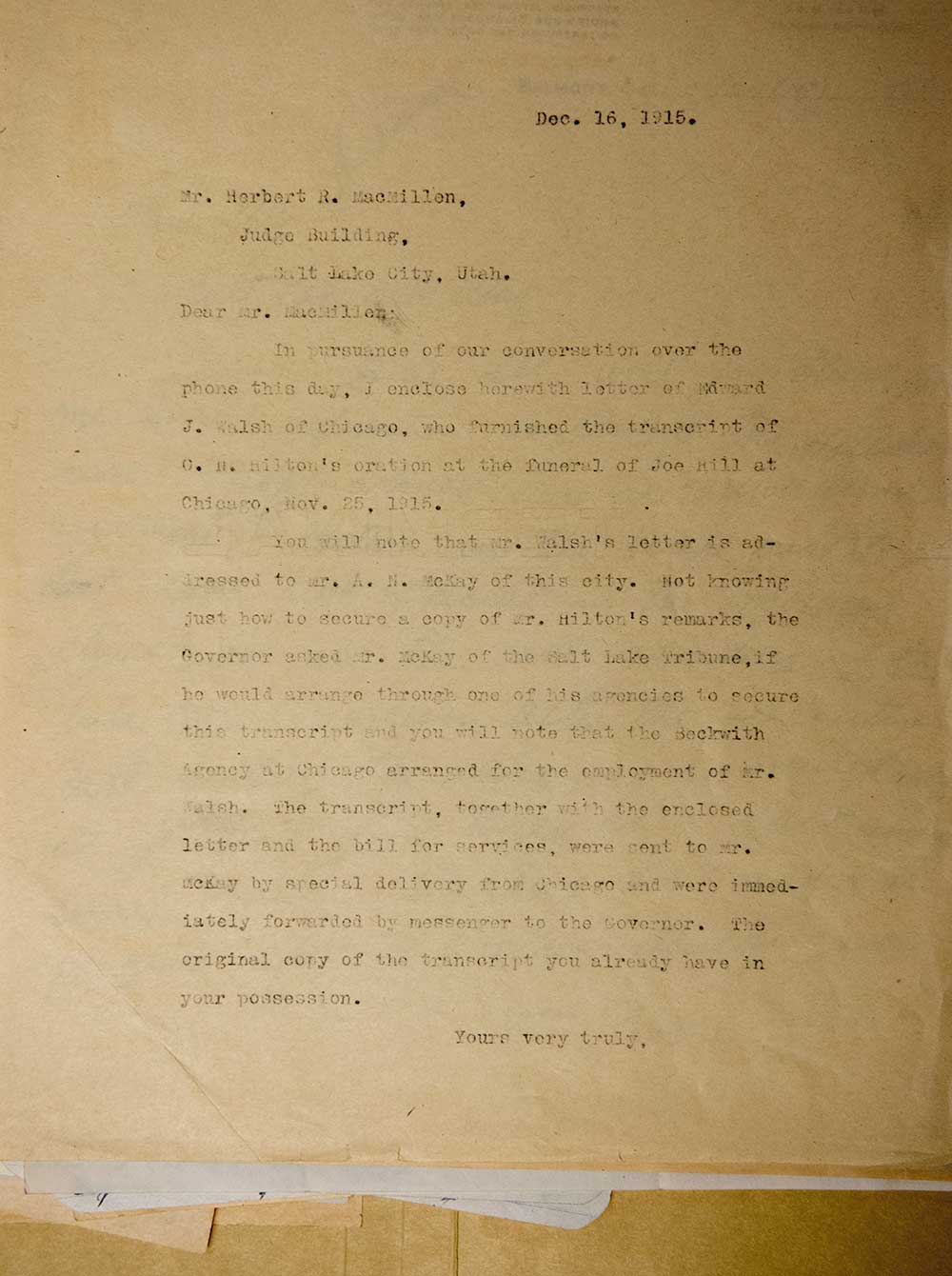
Photo by Jeremy Harmon, The Salt Lake Tribune
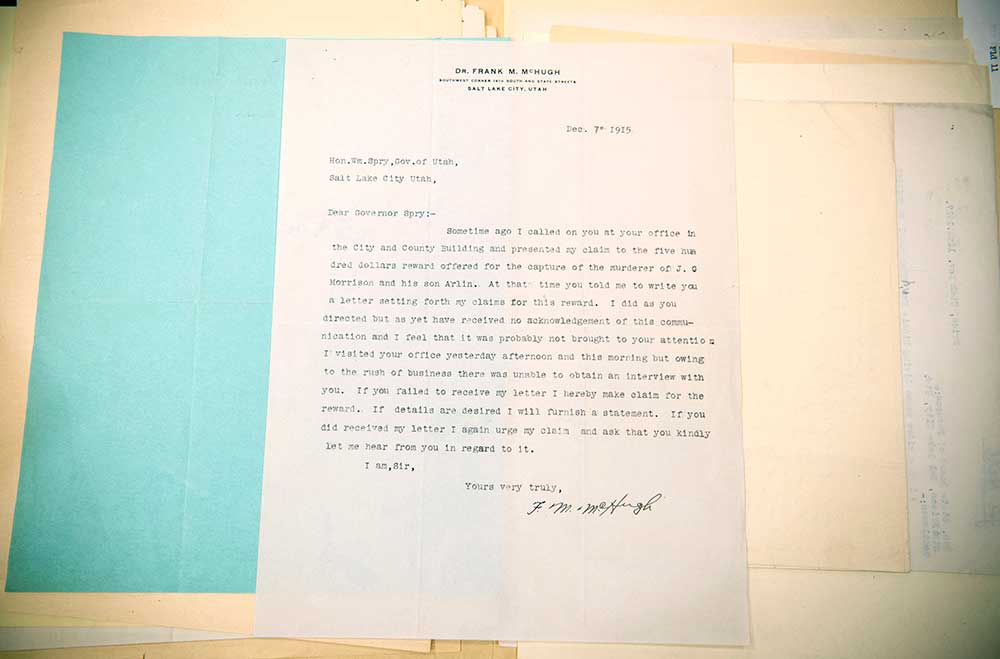
The doctor wants the reward
The top letter is from Dr. Frank McHugh, who treated Joe Hill for a gunshot wound in Murray the night the Morrisons were murdered.
Written about two weeks after Hill was executed, it begins by reminding the governor that McHugh had "presented my claim to the five hundred dollars reward for the capture of the murderer of J.G. Morrison and his son Arlin [sic]." McHugh explains he had not received a response to his letter claiming the reward.
The governor's office responded that a number of people had made claims, and that McHugh would be invited to a hearing to determine who would get the reward.
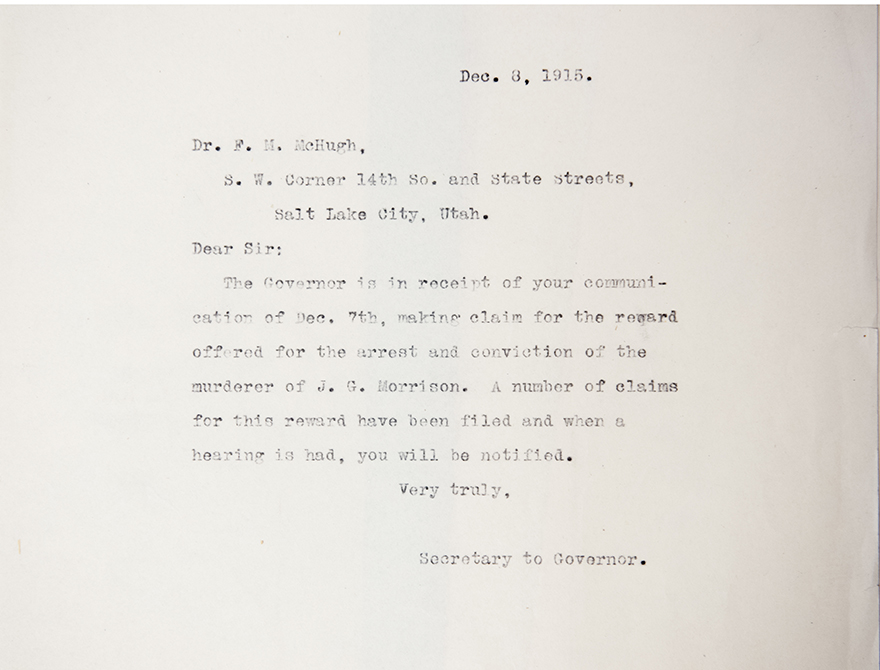
Read more about the night of the murders.
Photos by Jeremy Harmon, The Salt Lake Tribune
LDS apostle
These letters are between Gov. William Spry and David O. McKay, then an apostle in The Church of Jesus Christ of Latter-day Saints.
Top, McKay congratulates Spry on his handling of Hill's case, saying, "You deserve the hearty approval and the admiration of all law-abiding people." Spry thanked McKay for his support, saying, "It is gratifying to know we have the support of the people, and I wish again to express my personal appreciation of your kindly expressions."
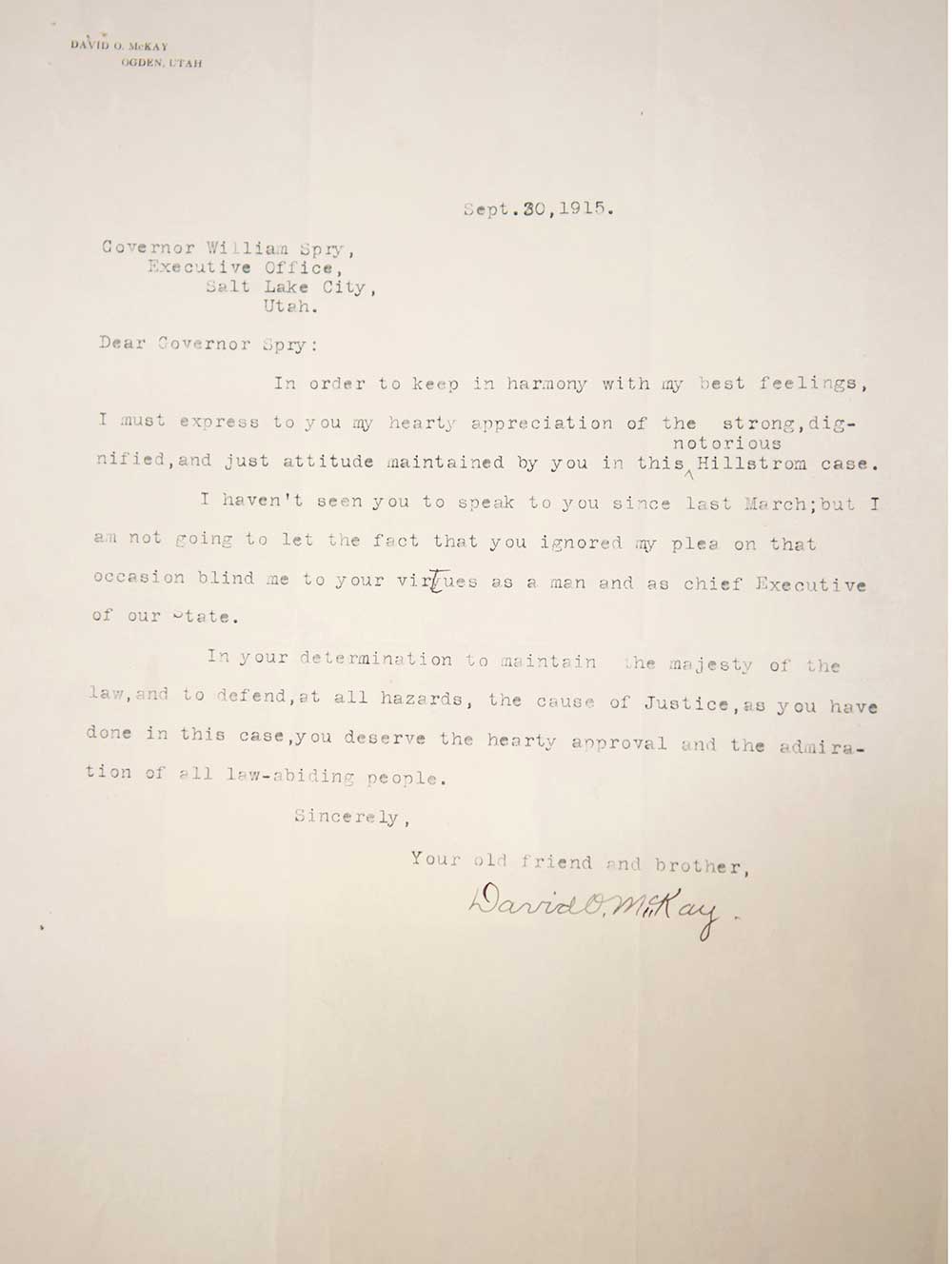
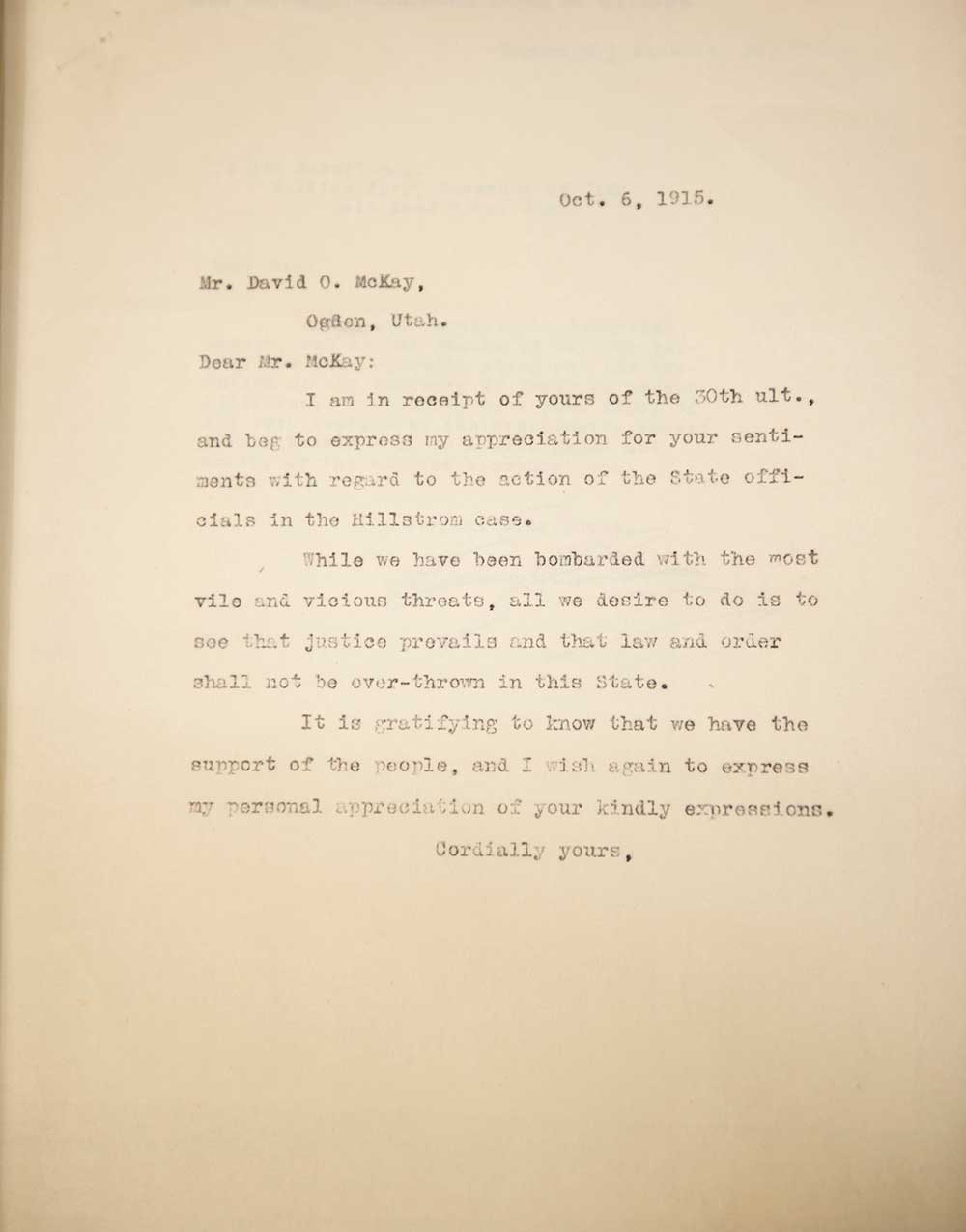
Photos by Jeremy Harmon, The Salt Lake Tribune
Offer to shoot Hill
In this letter, John V. Strachovsky of Cleveland, Ohio, offers to travel to Utah and execute Joe Hill for the state. The letter is dated two days before the execution in November 1915.
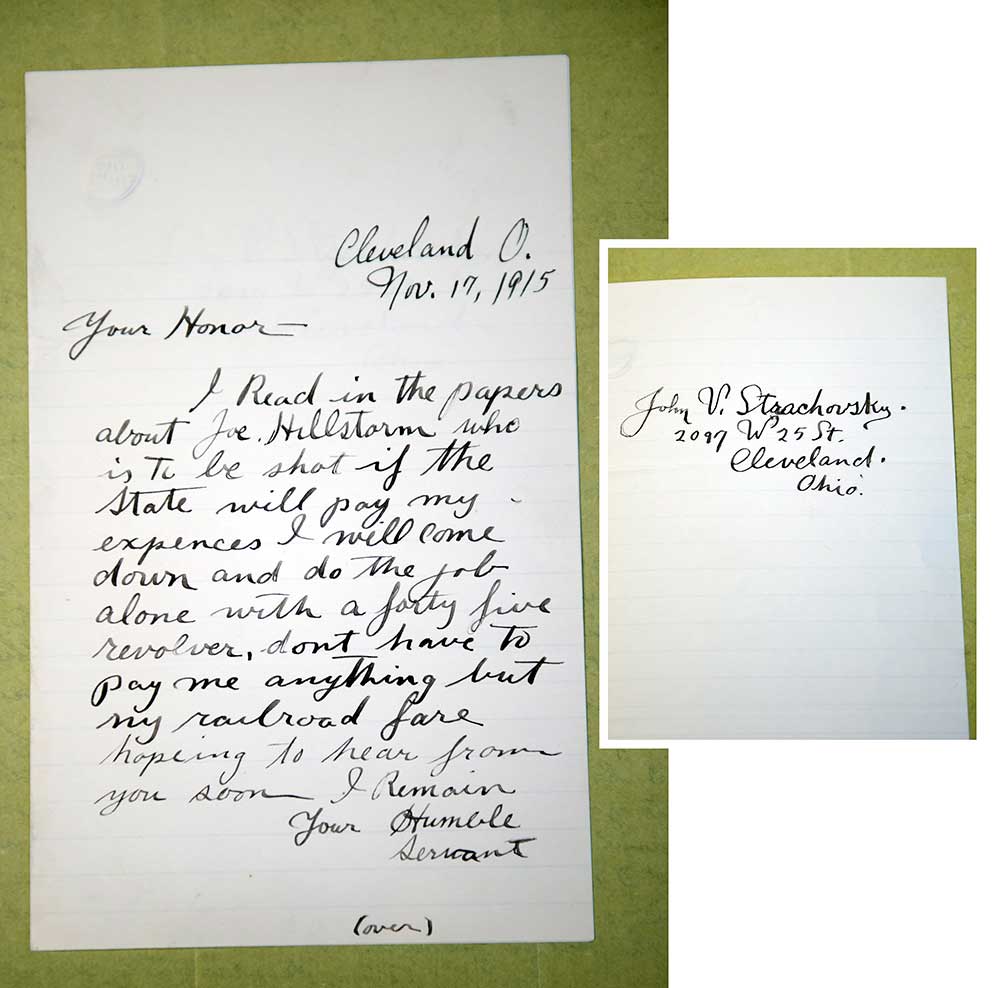
Photo by Jeremy Harmon, The Salt Lake Tribune
Board of Pardons
This open letter to Utah's Board of Pardons from Denver attorney Orrin N. Hilton was widely published at the time. Hilton, who had argued Hill's unsuccessful appeal to the Utah Supreme Court, read the letter when he spoke at Hill's funeral in Chicago.
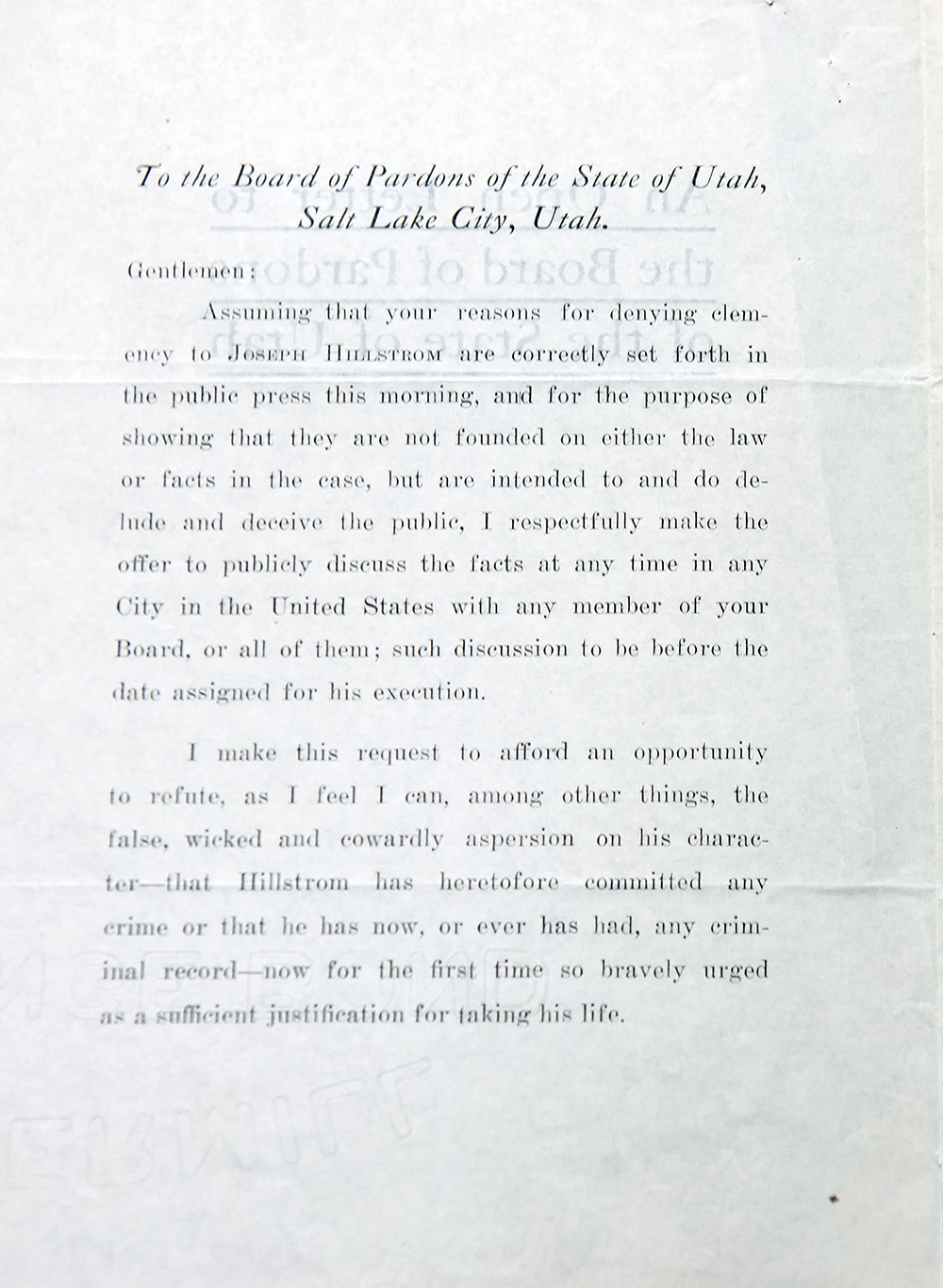
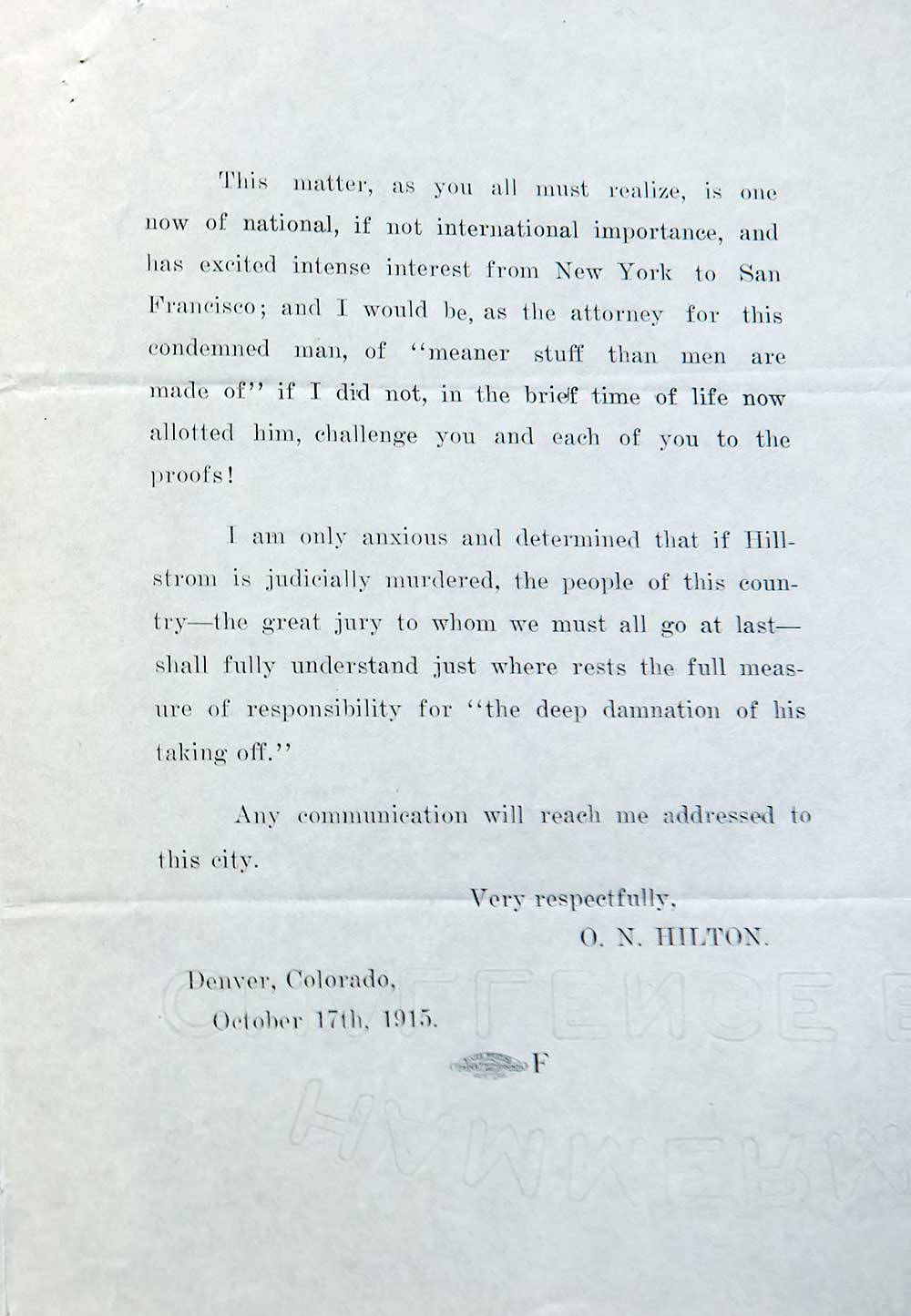
Photo by Rick Egan, The Salt Lake Tribune
Governor's form letter
Form letters like this one were sent to many people who wrote to Gov. William Spry and were critical of the state's handling of Joe Hill's case. John Hardy, who signed the letters, was the governor's secretary.
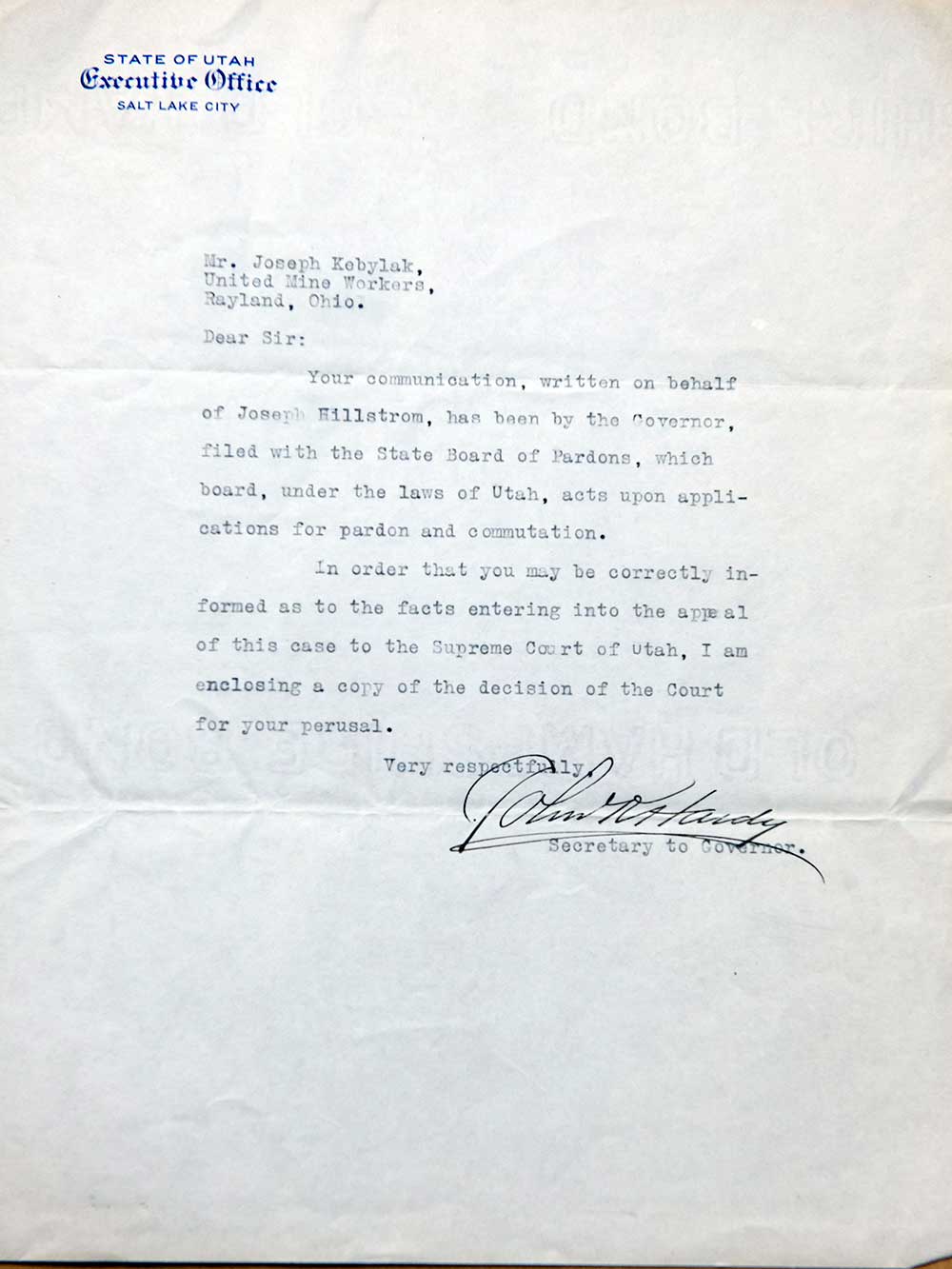
Photo by Rick Egan, The Salt Lake Tribune
Clemency plea
In this letter, Eugene V. Debs asks Gov. William Spry to grant clemency to Joe Hill. Debs was a co-founder of the Industrial Workers of the World and ran for president of the United States five times as a socialist.
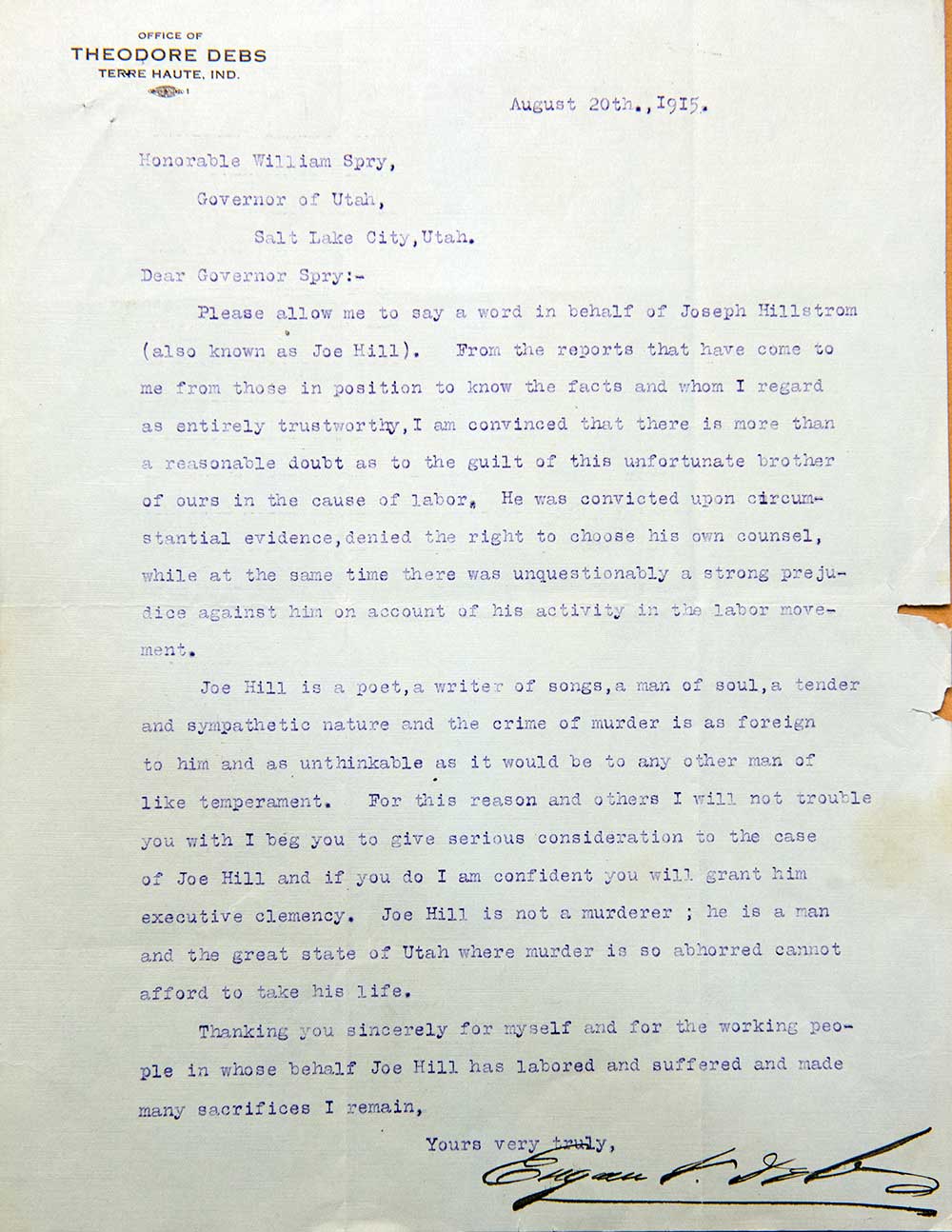
Photo by Rick Egan, The Salt Lake Tribune
Salvation Army
This letter, which asks Gov. William Spry to pardon Joe Hill, was written by Salvation Army officer O.B. Hansen of Spokane, Wash., four days before Hill was executed. The Industrial Workers of the World were often critical of Salvation Army tactics, and Hill parodied the group in his song "The Preacher and the Slave.After the execution
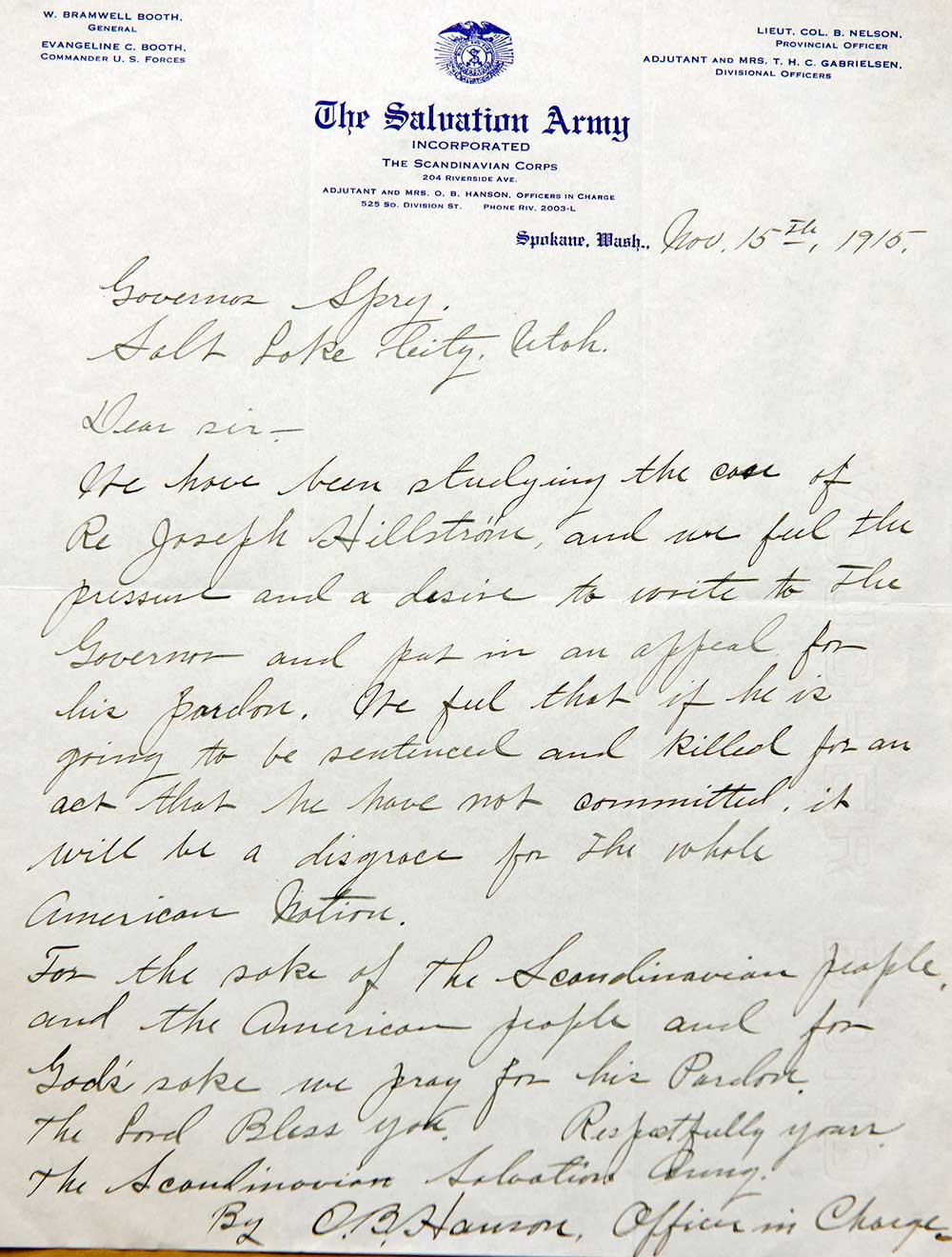
Photo by Rick Egan, The Salt Lake Tribune
A daily protest
This letter from C.W. Anderson, a Minneapolis-based organizer for the Industrial Workers of the World, begins, "Here again is my daily protest." It demands Hill's release.
Anderson sent so many letters that Gov. William Spry asked Minneapolis police to investigate him.
The city's superintendent of police responded, writing that the department was able to confirm only that Anderson was the head of the local IWW chapter. Anderson was among IWW members prosecuted during the Red Scare of 1919 and was sentenced to 9 years in prison under the Espionage Act.
At the end of World War I, he was granted amnesty after pressure had mounted on President Calvin Coolidge to free the country's political prisoners.
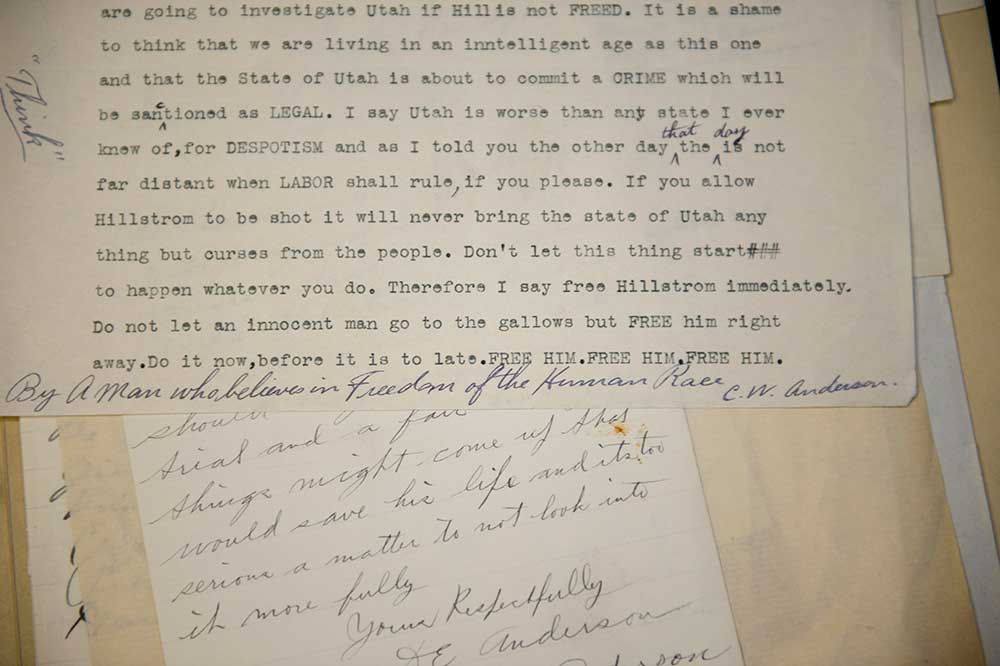
Photo by Jeremy Harmon, The Salt Lake Tribune
Woodrow Wilson
This telegram from President Woodrow Wilson to Utah Gov. William Spry in September 1915 resulted in a brief stay of Joe Hill's execution. A later, last-minute appeal from the president was rebuffed, and Hill was executed on Nov. 19, 1915.
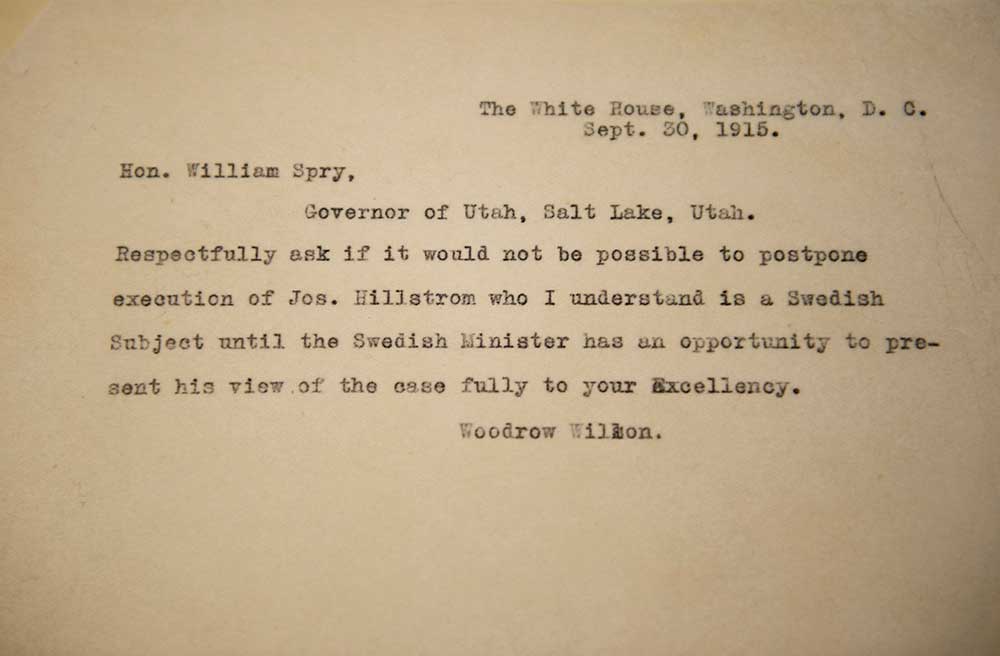
Photo by Jeremy Harmon, The Salt Lake Tribune
Stay of execution
This is the Sept. 30, 1915, order from Gov. William Spry granting Joe Hill a stay in his execution, following a request from President Woodrow Wilson.
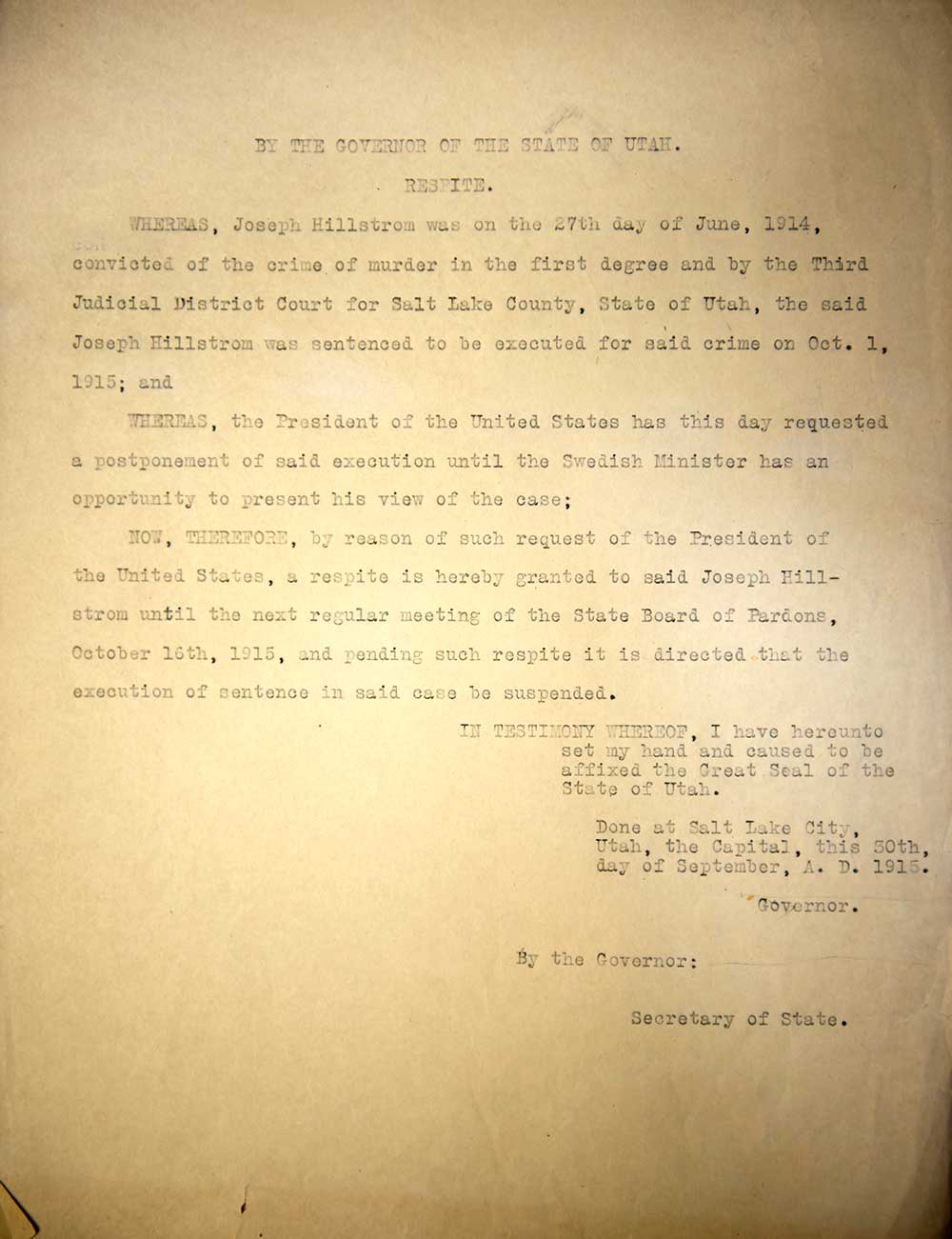
Photo by Jeremy Harmon, The Salt Lake Tribune
To the Swedish Minister
This is the telegram to Swedish Minister W.A.F. Ekengren informing him of Gov. William Spry's decision in September 1915 to temporarily stay Joe Hill's execution.
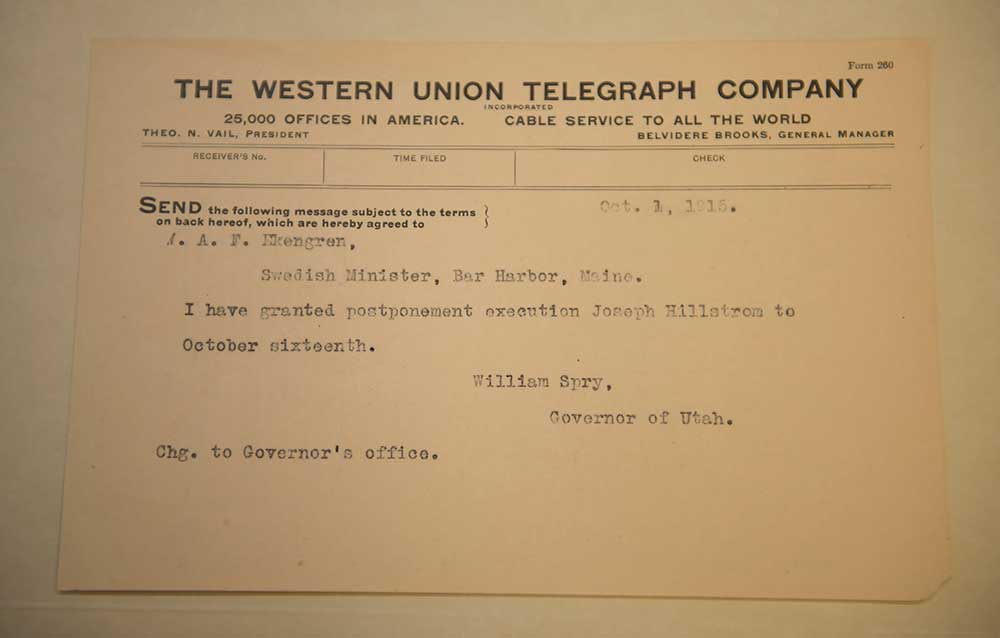
Photo by Jeremy Harmon, The Salt Lake Tribune
From the Swedish Minister
This is the telegram from Swedish Minister W.A.F. Ekengren asking Gov. William Spry to postpone Joe Hill's execution to give the minister time to review the case.
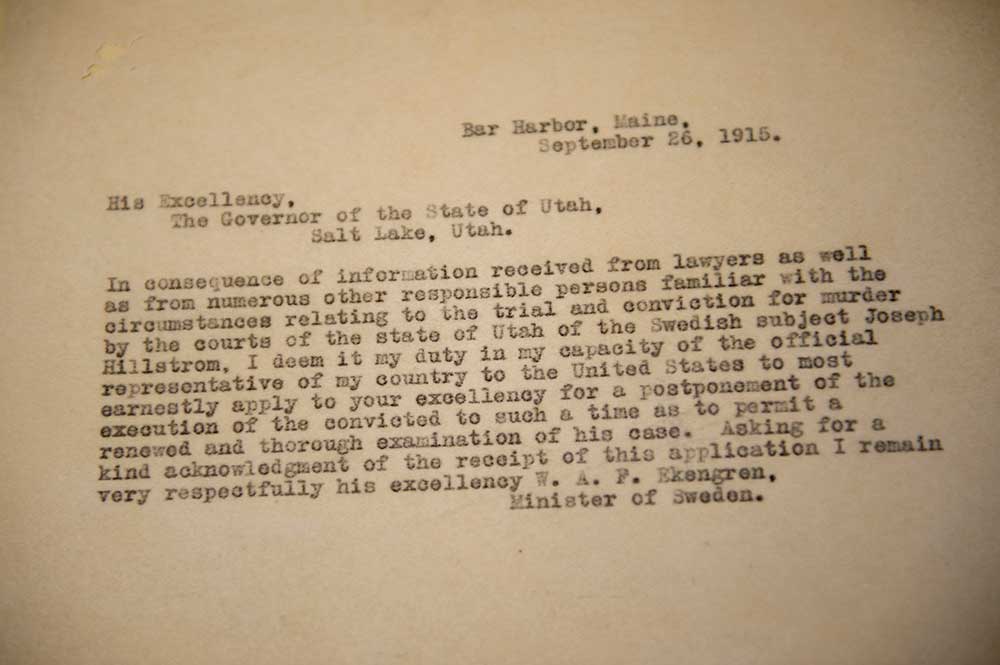
Photo by Jeremy Harmon, The Salt Lake Tribune
Postcard campaign
In the weeks leading up to Joe Hill's execution, the Utah governor's office received thousands of postcards like this one. They were part of a campaign organized by the Industrial Workers of the World to try to free Hill.
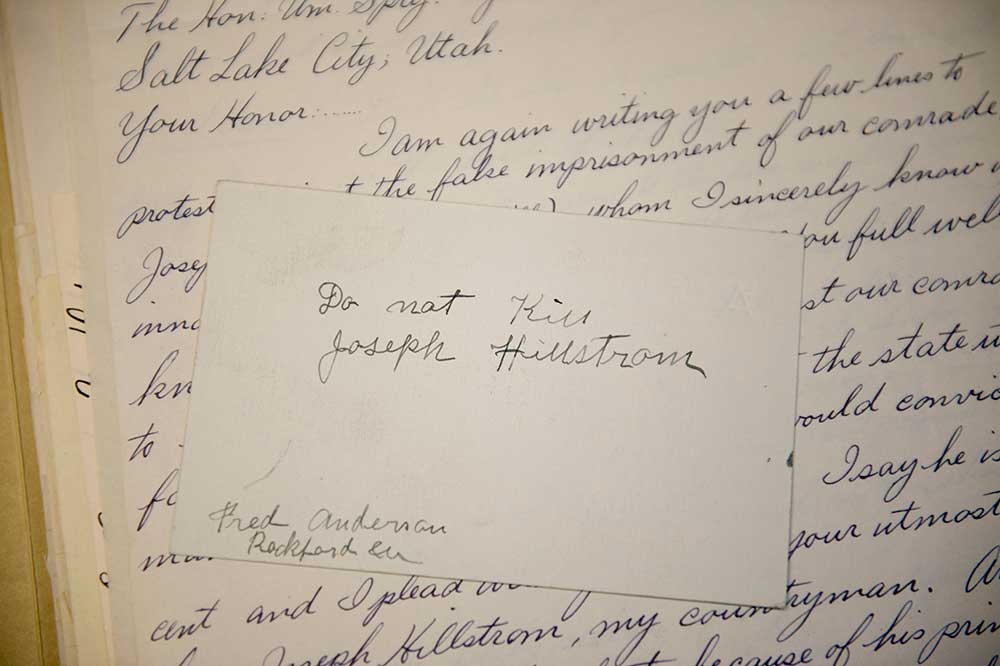
Photo by Jeremy Harmon, The Salt Lake Tribune
"Dastardly outrage"
This letter, signed by Industrial Workers of the World leader William Beck, protests the conviction of Joe Hill on "manufactured evidence" and calls for the working class in America to "present a solid front in a nation wide protest against this dastardly outrage." Beck had been involved in California's Wheatland Hop Strike in 1913. When law enforcement arrived at Durst Ranch, striking workers were singing Hill's song "Mr. Block." Two workers and two county officials were killed in the confrontation.
Beck was one of four men charged with the deaths of the county officials, but he was acquitted in January 1914. No charges were filed in the deaths of the workers.
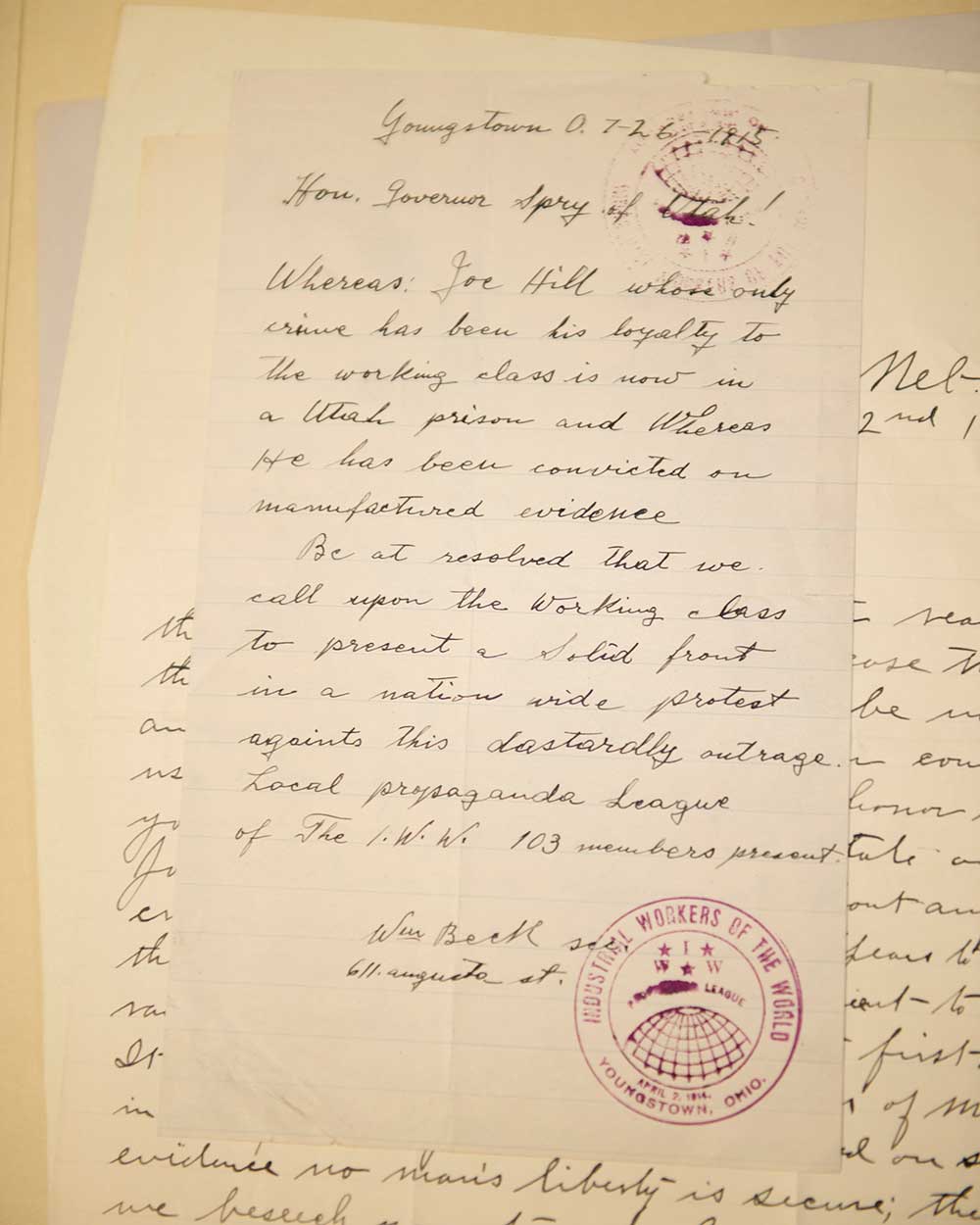
Photo by Jeremy Harmon, The Salt Lake Tribune
Boston Globe reporter
Frank P. Sibley, a reporter for the Boston Globe, wrote this letter to Utah Gov. William Spry after Sibley attended three days of Boston rallies in support of Joe Hill weeks before the execution. Sibley refers to Spry's attendance at the National Governor's Conference held in Boston months earlier, in August 1915, and writes that any respect Spry may have won during the conference has been lost because of public support for Hill.
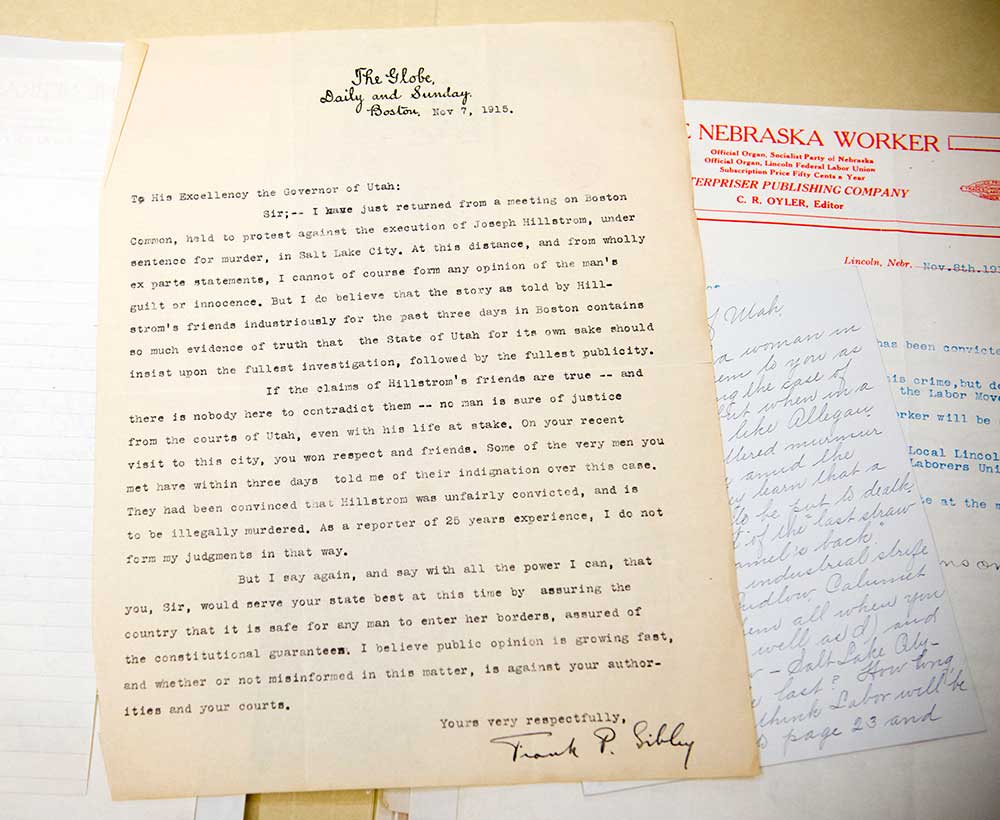
Photo by Jeremy Harmon, The Salt Lake Tribune
Supporters ordered to appear
This letter orders several supporters of Joe Hill to appear before the Utah Board of Pardons on Sept. 28, 1915.
Virginia Snow Stephen, an art professor at the University of Utah and the daughter of late LDS Church President Lorenzo Snow, and Oscar Larson, the head of Salt Lake City's branch of the Swedish organization Verdandi, were two of Hill's most prominent local defenders.
Sigrid Bolin was the sister of U. professor Jakob Bolin, and Torild Arnoldson was a former Swedish consul who was also a U. professor.
The Board of Pardons was made up of Utah's Supreme Court justices and Gov. William Spry.
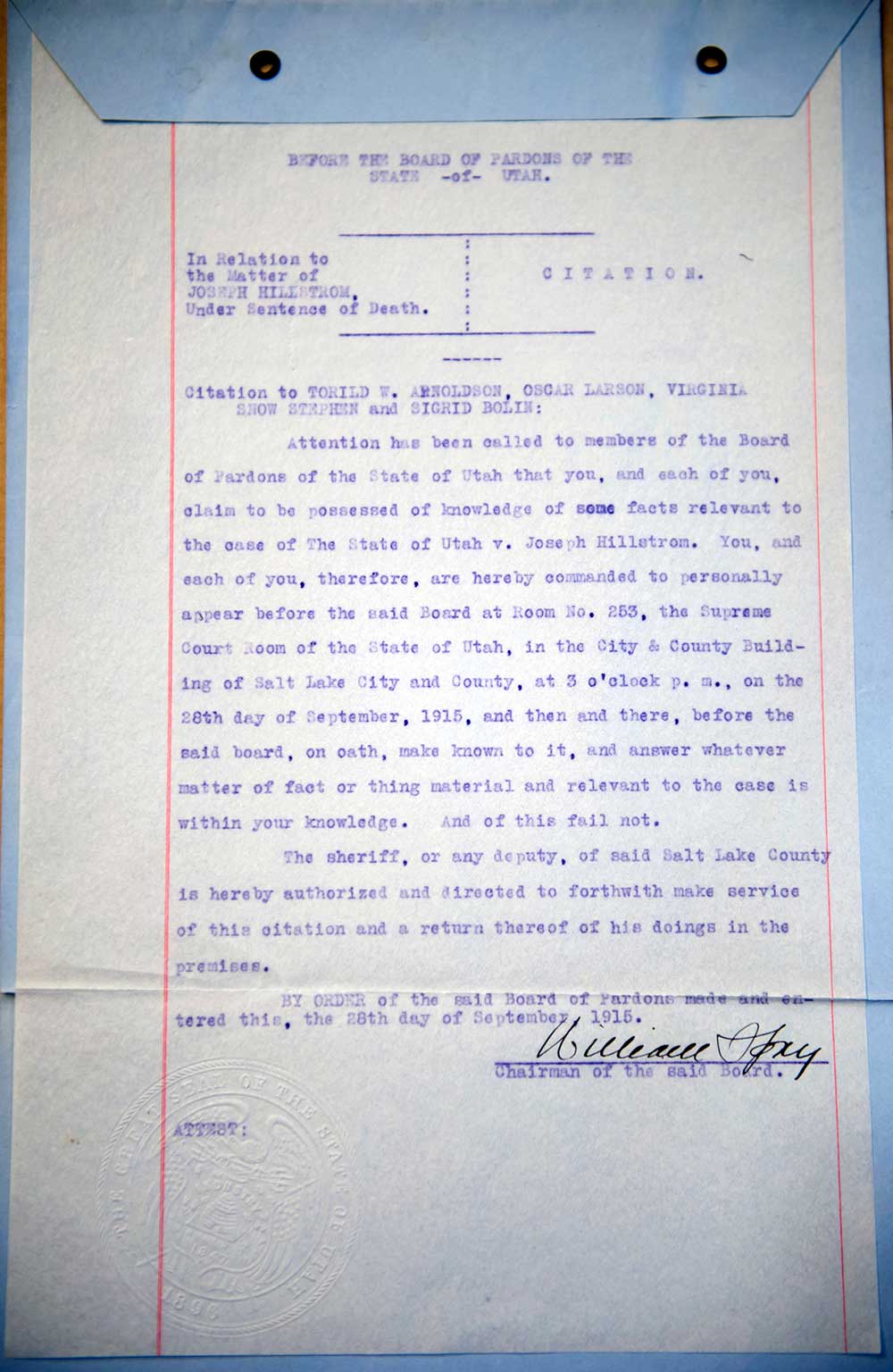
Photo by Jeremy Harmon, The Salt Lake Tribune
The Pinkertons
William Pinkerton, head of the famed detective agency, sent this letter to Gov. William Spry the day after Joe Hill was executed. Pinkerton had visited Salt Lake City to help plan protection for Spry, who had been receiving threats.
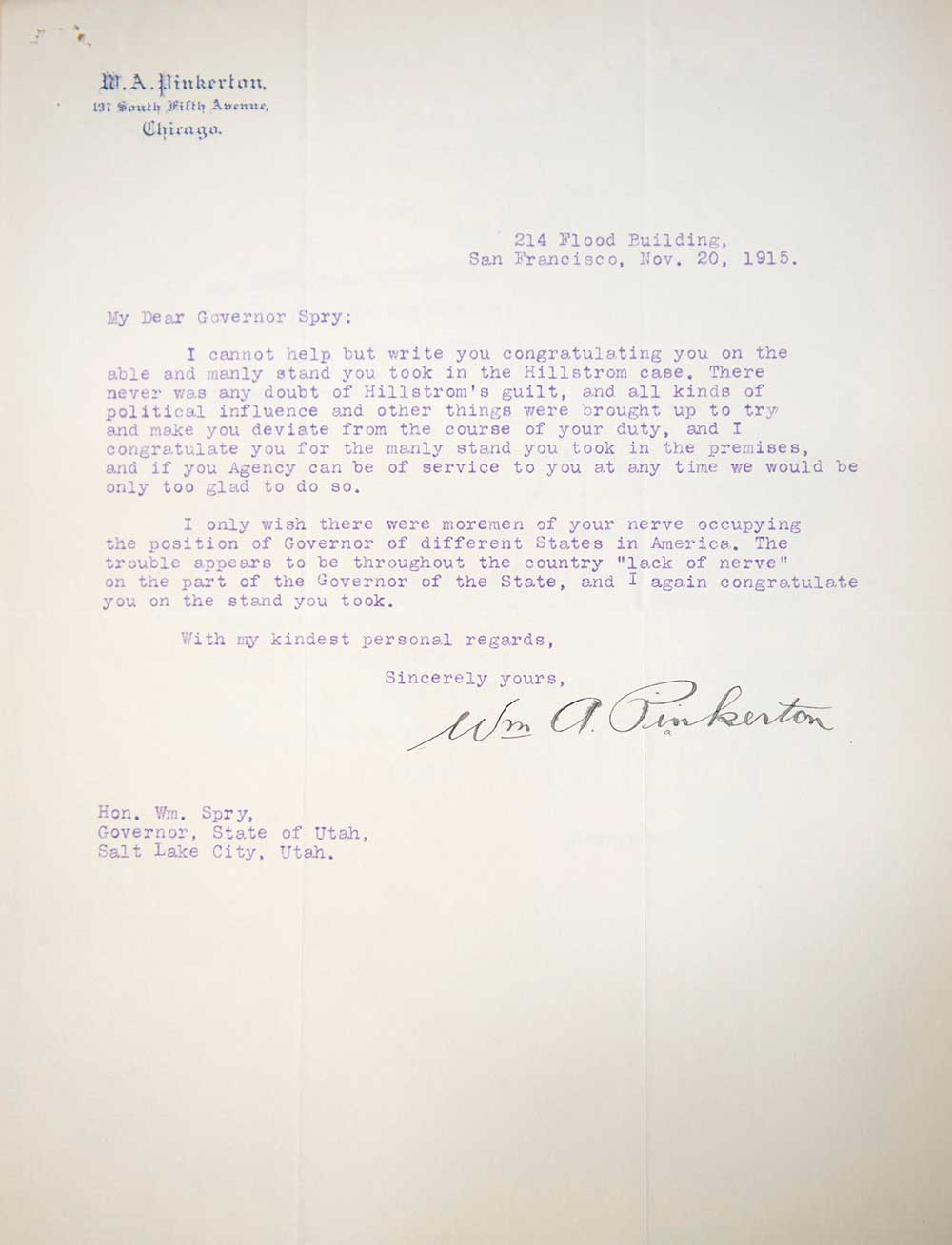
Photo by Jeremy Harmon, The Salt Lake Tribune
"Sabatoge"
This letter, written nine days after Joe Hill's execution, was sent to Gov. William Spry's secretary, John Hardy, by Frank Garwood, who was an investigator for the Department of Justice. Garwood included a copy of Elizabeth Gurley Flynn's essay "Sabotage" and the Industrial Workers of the World's "Little Red Songbook.After the execution
Garwood writes that he is trying to get a feel for the "conditions" in Seattle before heading to San Francisco.
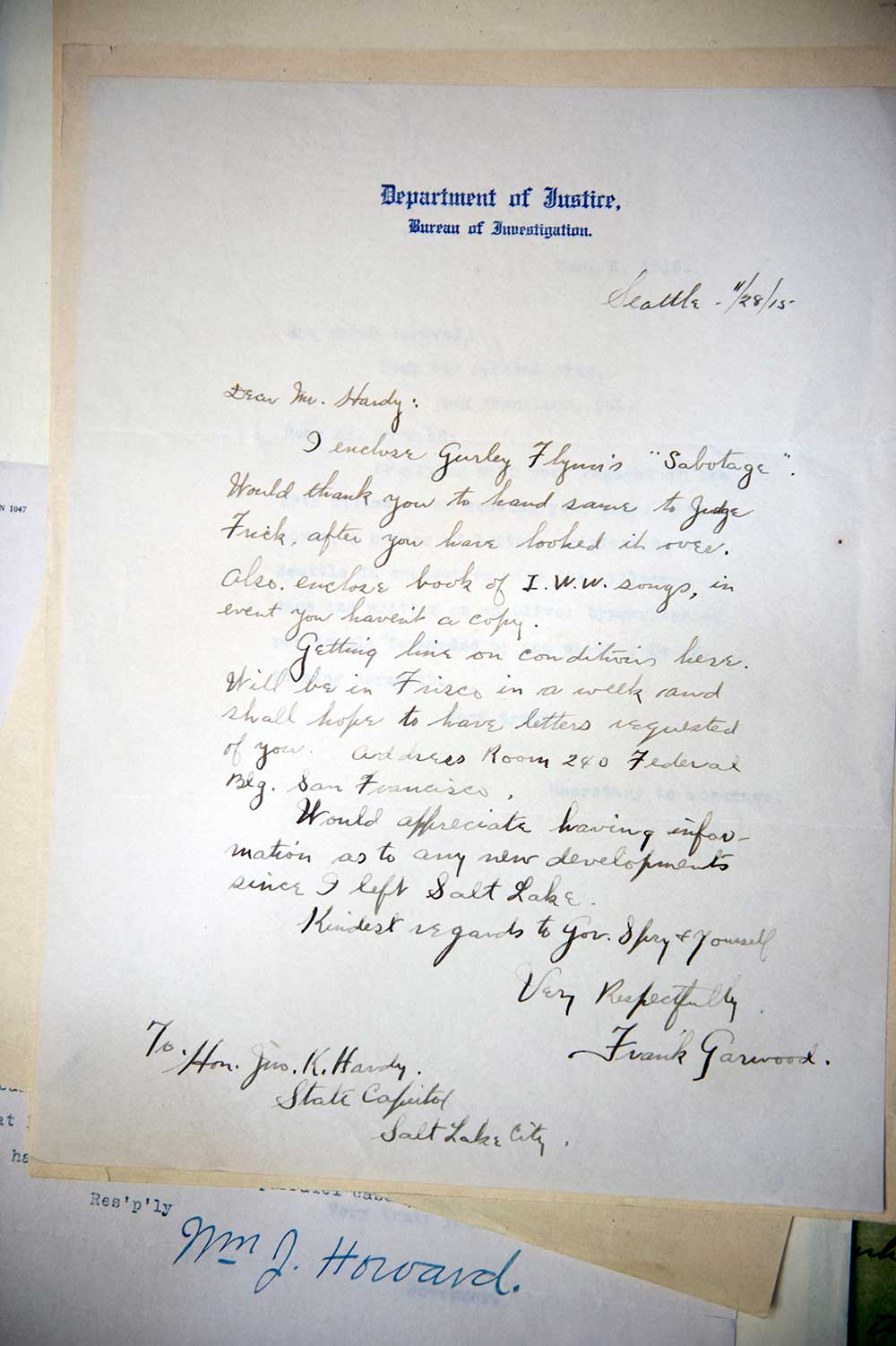
Photo by Jeremy Harmon, The Salt Lake Tribune
IWW pleas for pardon
In this letter, Industrial Workers of the World organizer James Rowan pleads with Gov. William Spry to pardon Joe Hill.
Rowan worked in the Pacific Northwest and was instrumental in organizing workers in the lumber industry. He also witnessed the violence in Everett, Wash., in November 1916, when seven people were killed and nearly 50 injured as about 200 deputies tried to prevent a ferry carrying IWW members from landing at the city's docks.
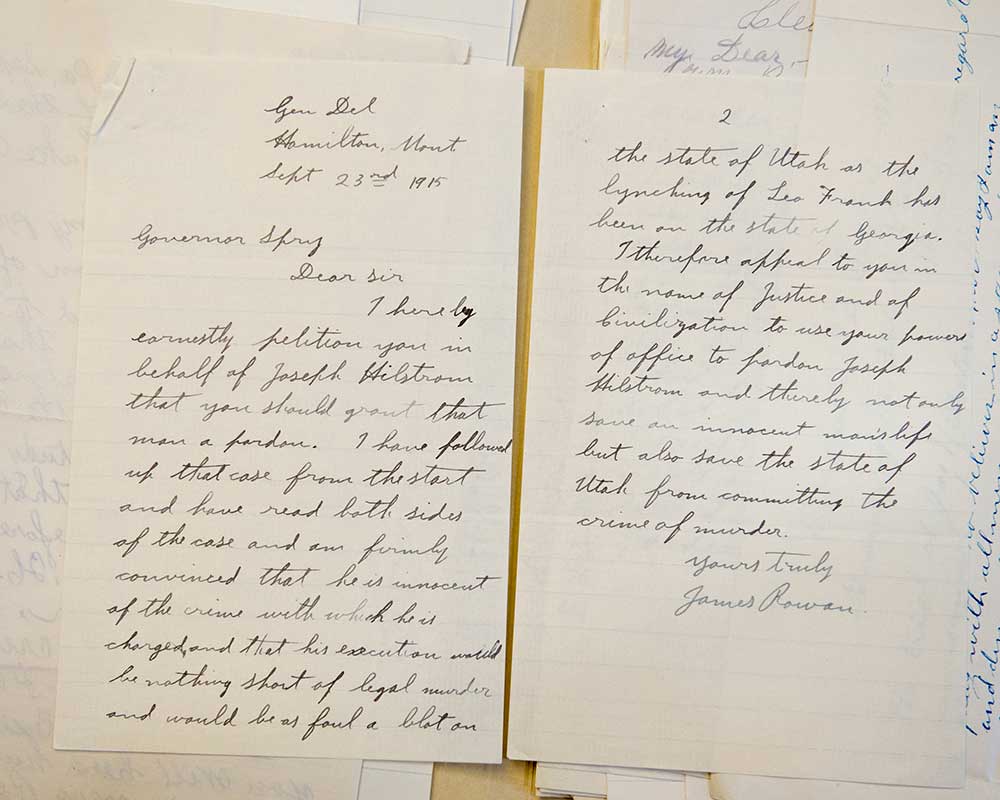
Photo by Jeremy Harmon, The Salt Lake Tribune
Another plea
James F. Morgan was a Utah-based member of the Industrial Workers of the World involved in the Tucker railroad strike in Spanish Fork Canyon in 1913. Morgan spent 60 days in jail in Provo after the strike. He then took a train to Salt Lake City, where the IWW held a rally for him at the corner of 100 South and Regent Street, across the street from what is now the Cheesecake Factory at City Creek Mall.
As the rally started, Morgan and others were attacked by men led by Axel Steele, a security guard for Utah Copper who also was deputized in a handful of Utah counties. Morgan was clubbed into unconsciousness. IWW member Tom Murphy shot Steele and a riot broke out. Steele wasn't seriously injured, and the next day Salt Lake City papers heralded him as a hero for leading the attack on the rally.
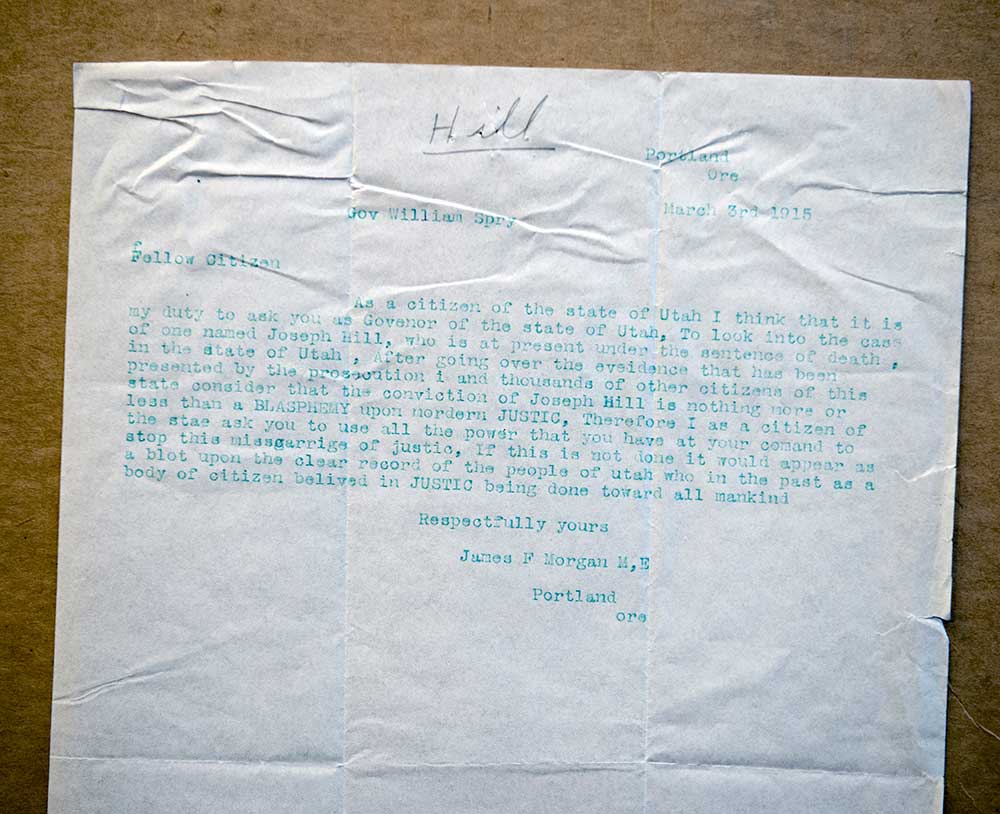
Photo by Jeremy Harmon, The Salt Lake Tribune
Wobblies threat
This letter from an anonymous Industrial Workers of the World member from Bend, Ore., claims that if Joe Hill is executed, a large number of Wobblies will come to the state and destroy private property in retaliation.
While eschewing personal threats to Spry – "No I.W.W. would think of taking your life we are not murders [sic]" – the letter says, "your police and your soldiers can't gard [sic] everything all the time. The life of Joe Hillstrom is worth more to me and my class than all the property in Utah."
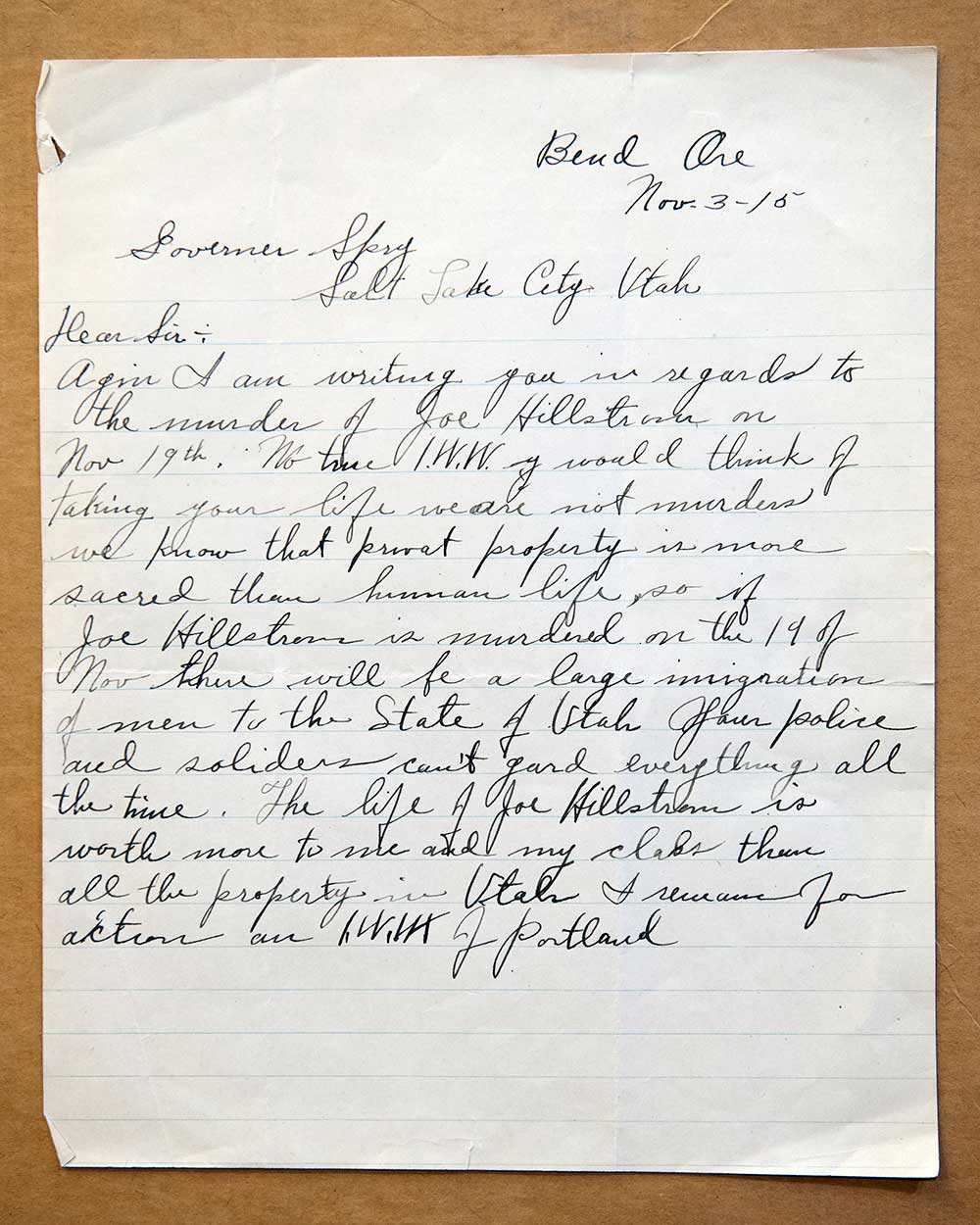
Photo by Jeremy Harmon, The Salt Lake Tribune
After the execution
In this Nov. 21, 1915, letter, Rep. Emil S. Lund of Salt Lake City asks to be allowed to attend a conference Gov. William Spry hoped to hold with state authorities to address issues related to Joe Hill's execution. Lund was a socialist and spoke at Hill's Salt Lake City funeral the day he sent this letter. He hoped his insights into the plight of the working poor would be of value to the governor.
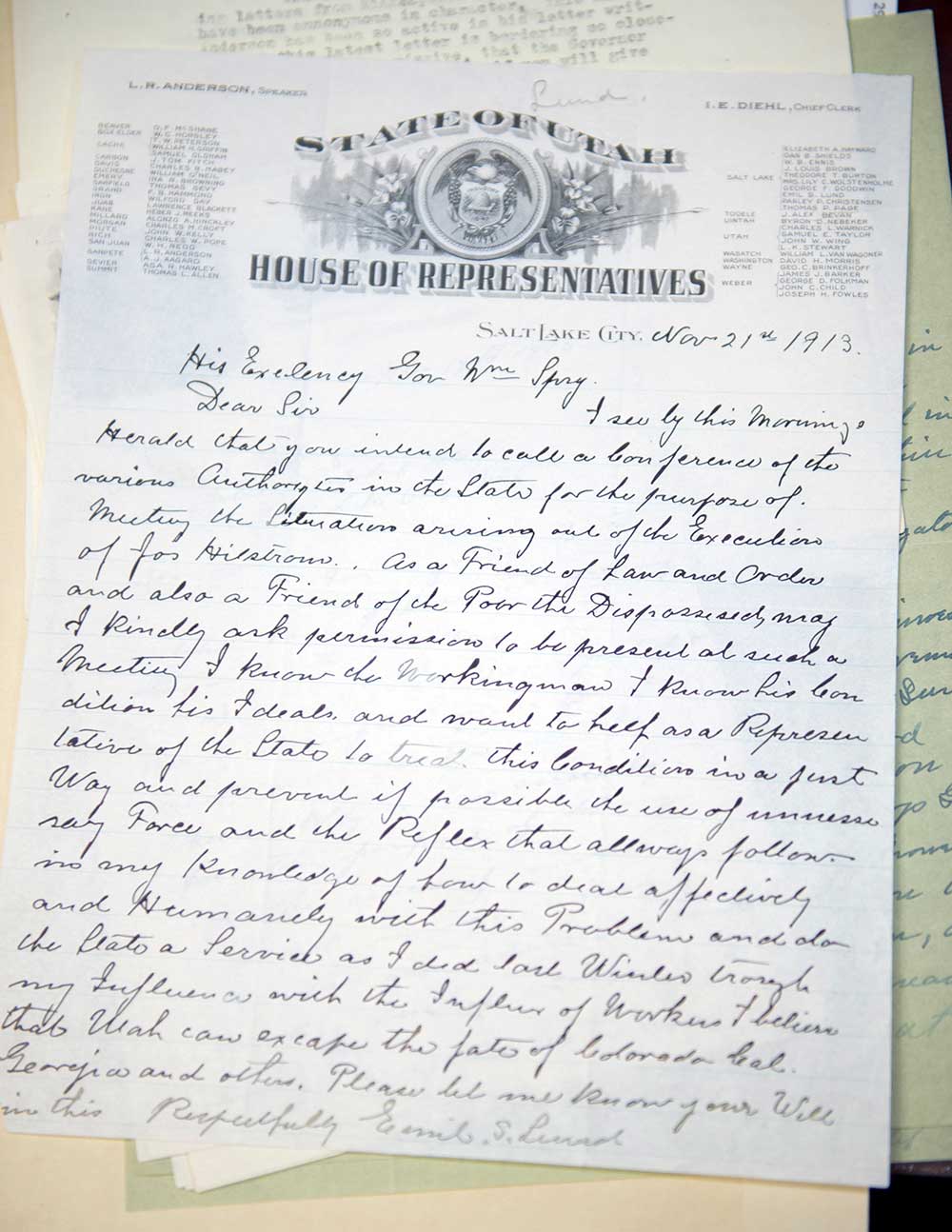
Photo by Jeremy Harmon, The Salt Lake Tribune


